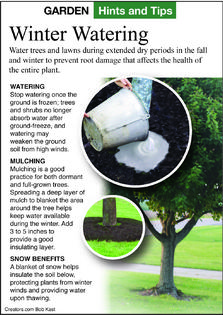The Greener View: Watering Fall Plants
Q: With the drought conditions we experienced this summer, what should we do for watering this fall to help our plants make it through the winter? Especially for some new perennial flower beds we planted in the spring.
A: The answer for this fall is to not stop watering until the ground freezes. If your area doesn't freeze at all or only for a very short time, you may need to keep watering all winter.
Some areas of the country received rain from a hurricane or two this year, but many areas did not. The rains that did fall often came between long dry spells, so the water ran off before it could soak in very deep. Where conditions have been dry for more than a few months, the subsoil dries out. This becomes a problem for deeper-rooted trees and shrubs as well as many perennial plants.
Trees, shrubs and perennials grow temporary water-absorbing roots each spring. When they only find dry soil, they die. A smaller root system means they do not have as much area in the ground to draw water from. The plants may not be able to store enough moisture to last the entire winter.
If there is lots of snow cover in the northern states this winter, most plants will be fine. If there are long periods of time with no snow and with lots of wind, newly planted plants and some lawn areas may dry out and die. Even though the grass, shrubs and other plants are dormant and may not even have leaves, the roots, crowns, stems and trunks still need some moisture to survive. Evergreens are much more sensitive to drying out in the winter because their leaves are exposed to the cold dry winds.
The best time of day to water is in the early morning hours. The plants can dry off soon after the watering as the sun comes up and are less likely to develop fungal diseases. Water long enough to get the soil wet about 6 to 8 inches deep. This will get to the majority of the roots of most grasses, shrubs and newly planted material.
In cool fall weather, once per week or two should be fine for most plants. Small grass plants in new lawn areas and shrub bed areas next to a building or on a south-facing slope where the temperature stays warmer and the soil may dry out faster may need to be watered more often and longer into the fall.
Once the ground freezes, you can quit. If the winter weather does not give enough moisture, it will be beneficial to do more watering. If the ground is frozen, the watering will do no good, unless you also want to ice skate on your lawn. Many areas of the country get a January thaw that gives us a week of above-freezing temperatures. That would be a good time to get a little water to the grass and evergreens, but most other plants won't need the watering.
After each watering, do not leave water in the hose and let it freeze or you will have a hard time rolling it up. You might also damage the hose spigot and get a leak in the house.
Even though the winter may have a normal or even above-normal amount of precipitation, the damage done by the dry soil in late summer or fall will already have been done to the plants. If your landscape is dry, this fall is a critical time to water.
Your perennials and any new plants will benefit from a 3-inch layer of mulch covering the roots and dormant crown. Shrubs and trees need to have the root area covered in mulch. This mulch helps retain soil moisture and evens out the freezing and thawing cycles. Since the soil in new planting areas and the original soil are often different in texture and water content, they will freeze at a different rate. This can lead to some plants being pushed up out of the ground, where they will dry out and die. After the plant has established roots into the surrounding soil, that kind of frost action will not happen anymore.
========
Email questions to Jeff Rugg at info@greenerview.com. To find out more about Jeff Rugg and read features by other Creators Syndicate writers and cartoonists, visit the Creators Syndicate website at www.creators.com.
Copyright 2024 Jeff Rugg. Distributed By Creators.








Comments